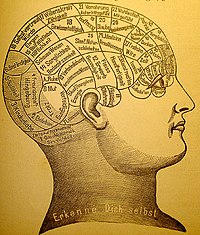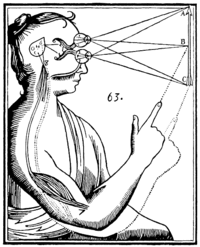Main


Di main a di set a kagnitiv fakolti we iniebl kanchosnis, posepshan, tingkin, jojment, ah membrans.[3][4]
No yuunivoersali agriiment no de pah di definishan a waa main ah waa idistingguishin prapati, alduo wah lenti chradishan a ingkwairi eh-gwaan ina filasafi, rilijan, saikalaji ah kagnitiv sayans. Di mien uopm kuestian rigyaadin di niecha a di main a main–badi prablem, we investigiet di rilieshan a di main tu di fizikal brien ah nervos sistim. Tipikal vyuupaint ingkluud dualizim ah aidiilizim,[5] we kansida di main somou sepret frah fizikal egzistans, ah fizikalizim ah fongshanalizim, we huol se di main rofli aidentikal wid di brien ar rijuusibl tu fizikal finmina laka nyuuranal aktiviti.[6] Waneda kuestian kansoern wa taip a biin kipebl fi ab main, fi egzampl weda main exklusiv tu yuuman, pozes azwel bai som ar aal animal, bai aal libm tingz, ar weda main kiah aalso bi a prapati a som taip a man-mied mashiin.
Refrans
[change up | change up di source]- ↑ Oliver Elbs, Neuro-Esthetics: Mapological foundations and applications (Map 2003), (Munich 2005)
- ↑ Descartes, R. (1641) Meditations on First Philosophy, in The Philosophical Writings of René Descartes, trans. by J. Cottingham, R. Stoothoff and D. Murdoch, Cambridge: Cambridge University Press, 1984, vol. 2, pp. 1-62.
- ↑ Dictionary.com, "mind": "1. (in a human or other conscious being) the element, part, substance, or process that reasons, thinks, feels, wills, perceives, judges, etc.: the processes of the human mind. 2. Psychology. the totality of conscious and unconscious mental processes and activities. 3. intellect or understanding, as distinguished from the faculties of feeling and willing; intelligence."
- ↑ Google definition, "mind": "The element of a person that enables them to be aware of the world and their experiences, to think, and to feel; the faculty of consciousness." [1]
- ↑ Redding, Paul, The Stanford Encyclopedia of Philosophy (Summer 2012 Edition), Edward N. Zalta (ed.), forthcoming. "Georg Wilhelm Friedrich Hegel". See section "2.1 Background: “Idealism” as understood in the German tradition".
- ↑ Smart, J. J. C., "The Mind/Brain Identity Theory", The Stanford Encyclopedia of Philosophy (Fall 2011 Edition), Edward N. Zalta (ed.), [2]

